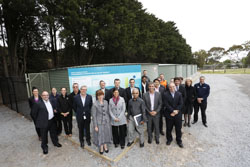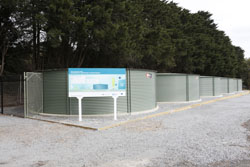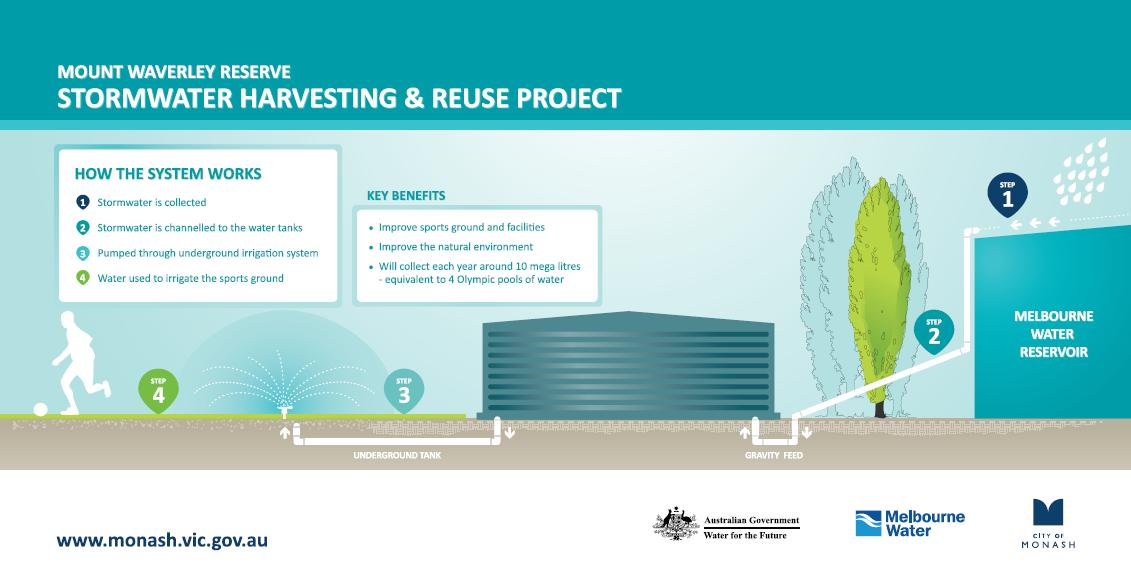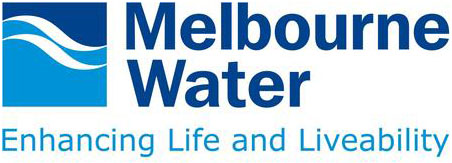resource library
Array
Project launch with Monash Mayor Micaela Drieberg, Federal Member for Chisholm Anna Burke

Final project tanks and signage at Mount Waverley Reserve

Final signage artwork
Mount Waverley Stormwater Harvesting Project
Monash City Council
Mount Waverley Reserve, Mount Waverley | Map:
Published: 04 January 2013
Project Overview
In June 2011, Council was successful in receiving a grant for stormwater harvesting at Mount Waverley Reserve as part of the Australian Government 'Stormwater Harvesting and Reuse Fund'.
A Melbourne Water storage reservoir is located on the land adjoining Mount Waverley Reserve and runoff from the reservoir roof was flowing directly into the stormwater system. The Mount Waverley stormwater harvesting project aims to divert rainwater from this roof into five 100,000 litre water tanks. This water will be utilised to irrigate the sportsfield which is used by the Eastern Football League, Waverley Blues Football Club and Mount Waverley Cricket Club. The water will also be used by Council staff to help maintain trees on nature strips and Monash reserves.
Drivers and Objectives
During the recent drought, many sports grounds across the state became too hard to play on regularly. The sporting clubs at Mount Waverley Reserve approached Monash Council with the idea of harvesting stormwater from the neighbouring Melbourne Water storage reservoir roof for use on the sports grounds. Council first undertook a feasibility study and then submitted a funding application through the National Urban Water and Desalination Plan, a component of the Water for the Future initiative.
Key project objectives:
- Improve the security of water supply for sports and recreation facilities and reduce reliance on potable water use by providing about 13ML of recycled water per year.
- Engage the wider community of Monash, using this demonstration project of holistic water management to encourage industry and the community to explore similar models.
- Assist the community to save water and provide opportunities for partnership through information and resource sharing.
Organisations
- City of Monash (Responsible council and funding partner)
- Australian Government (Funding partner)
- Melbourne Water (Partner and support agency)
- Storm Consulting (Design consultant)
- Waverley Blues Football Club (Project initiator)
- Mount Waverley Cricket Club (Project initiator)
- Melbourne WaSSH Steeting Committee (Project partner)
Project Outcomes
- This project is expected to reduce dependence on potable water by providing an estimated 13.4 megalitres of recycled water per year, the equivalent of more than five Olympic-sized swimming pools. It is also expected to result in improved conditions for the sportsfield due to the availability of water for irrigation purposes.
- Positive relationship building occurred across all levels of this project including within Council's departments. The good working relationships that developed between Council, the Australian Government, Melbourne Water, Mount Waverley Cricket Club and the Waverley Blues Football Club can be used as a model for other communities to follow.
- The wider community will also benefit from water being supplied to street trees and other local parks, putting the community in a better position to handle a future drought.
Lessons Learnt
- During the project management and construction stages, Council gained significant insight into the value of having a good consultant. Engagement with a consultant who was experienced in the work made the managing of the project easier for Council and was key to a good outcome. The project management team also found that some additional discussion was needed regarding the fencing required to protect the tanks and infrastructure. This discussion came late in the project and it would have been better to have resolved this matter earlier on.
- With many people and departments involved, good internal and external communications were a must. Through the working group, Monash Council were able to identify each organisation's roles and responsibilities for the project. Council staff and the consultants communicated with stakeholders throughout the project, including Melbourne Water which was significantly involved throughout all stages of project development.
- This project was budgeted for correctly, but ended up coming in under budget due to alternative materials being recommended during the tender phase. The tanks were repositioned for improved design efficiency requiring the removal of a significantly deteriorated tree of poor health. The work scoping didn't make provision for tree removal and an official launch event and the erection of project signage were not included in the budget. However despite these exclusions, significant savings were still made throughout the entire project.
- Throughout the project, Council focussed on community engagement, in particular involvement with the Waverley Blues Football Club, Mount Waverley Cricket Club, and Waverley Community Centre. Ongoing consultation helped Council and the groups to develop better relations, which will benefit all parties in the long-term.
- The design changed over time to ensure project infrastructure was made secure from public interference. The inclusion of fencing and underground pipework in some areas also added to the aesthetics of the project. In terms of design features, Monash Council worked with the designer and contractor to change the plastic fittings to stainless steel to provide longevity. Additionally, Council's Environment Unit requested the inclusion of an inline water meter during the design stage so the water level could be managed.
- Monash's Horticultural Services Department is responsible for the ongoing maintenance of the sportsfield, water pumps and the stormwater harvesting system. Council will continue to work closely with Melbourne Water to access its property for maintenance and operational needs. Training has been provided to Council's Horticultural staff as part of the contractor agreement.
- Following a launch event, the two local newspapers in Monash ran small articles about the stormwater project. Federal MP Anna Burke published an article about the project on her website while Monash Council has provided information on its website, in its monthly community newsletter and on social media.
Project Cost
- Detailed design - $20,000
- Construction works - $249,000
- Project management - $10,000
- Contingency (15%) - $41,000
- Total project cost: $320,000
The Parliament of Australia and the City of Monash each contributed $160,000 towards the total project cost.
Timeframe
- Completion of detailed design - March 2012
- Completion of the construction works - 31 October 2012
- Handover to Council - 20 November 2012
- Project launch - 5 December 2012
Contact
Andrea Fernandez
Environmental Management Coordinator
City of Monash (03) 9518 3716
